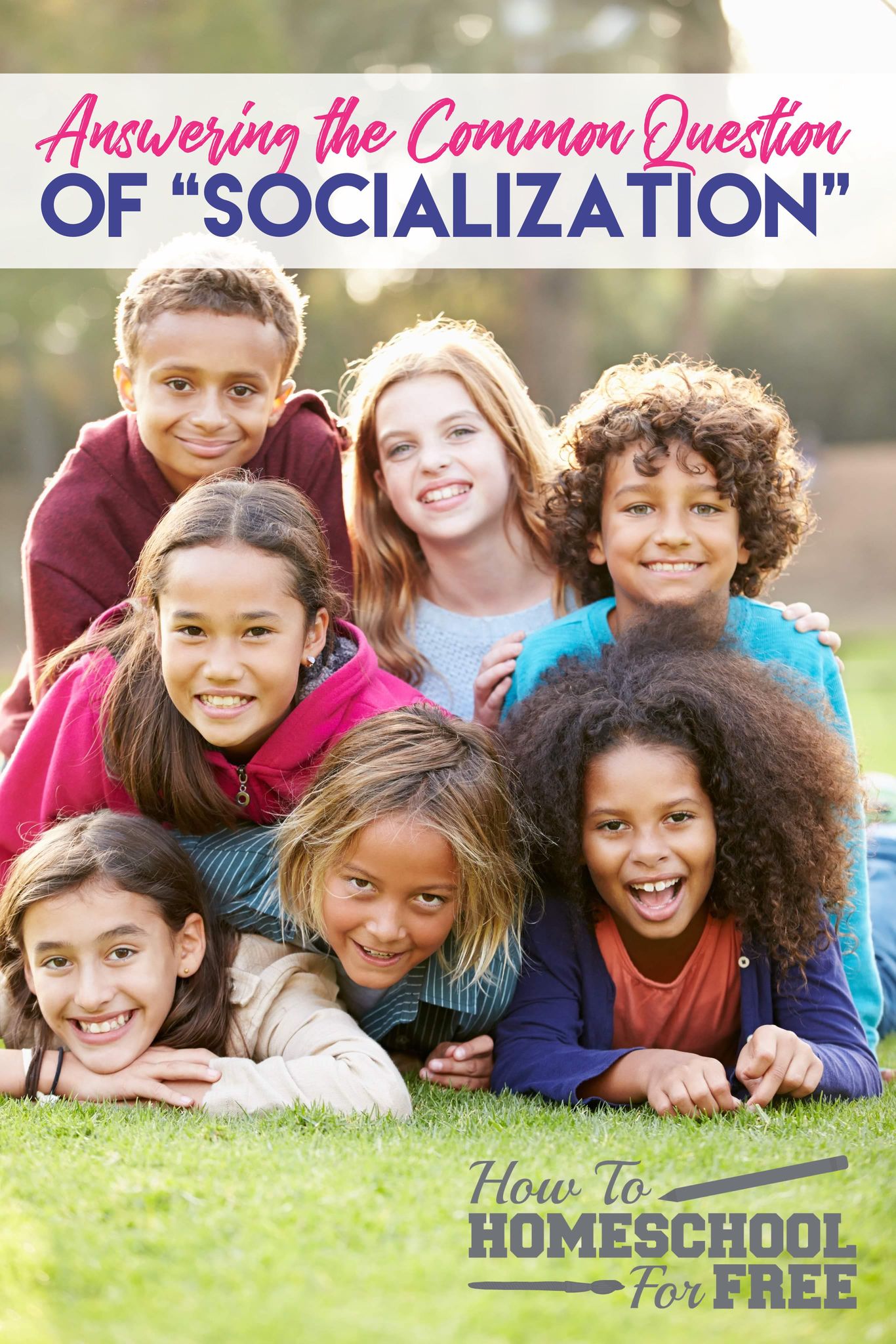“But, arent’ you worried about socialization?”
Ah, the “socialization” question; that not-so-thinly veiled judgment against a person’s decision to educate their own kids. It usually comes from a person who disagrees with homeschooling as a practice. It’s basically just a code for “aren’t you worried your kid will be weird?” Every time I hear this question I have to reign in a snarky comment before answering that, in fact, multiple studies show that homeschooled children are even better at socialization than their conventionally schooled peers. But how can that be?
Homeschool socialization can mean different things to different people
Some people are worried about kids making friends. Some wonder about cultural exposure – how will kids learn about diversity? And some people want to know how kids will learn about society’s norms – being able to follow rules, etc.
Well, according to a paper written on the topic of homeschool socialization by Richard Medlin of Stetson University,
All these things may be a part of socialization, but socialization can be more accurately defined as “the process whereby people acquire the rules of behavior and systems of beliefs and attitudes that equip a person to function effectively as a member of a particular society”
How does conventional school socialize our kids?
The thing is, conventional school is extremely institutional. 20-30 of the same kids, all the same age, go through the same routine with the same 2 or 3 teachers, every single day for almost 10 months. That sounds pretty sheltered and segregated to me.
In schools kids do not learn society’s rules of behavior, they learn the school’s rules of behavior.
If the goal is “equipping kids to function effectively as a member of society”, then you have to ask yourself: When will the school experience be replicated in adult life? Sure, they learn how to ask permission to go to the bathroom. They learn to sit silently and raise their hand to participate and only speak when spoken to. But when is that rigid format ever useful to them again? When will they ever need the skills to move in an assigned herd through their day? The only environment that comes to my mind is prison. I think we can all agree that is one we’re actively teaching them to avoid!
So how do homeschoolers socialize?
- youth sports teams
- gym-based sports like martial arts, ninja warrior, gymnastics
- dance, music & art classes
- co-op classes (group classes with other homeschoolers)
- community classes (think zoo school, summer camps, rec centers)
- group field trips
- clubs – 4H, Lego builders, book clubs, Pokemon leagues, robotics clubs
For example, my kids have been or are involved in:
- our neighborhood swim team
- twice a week jiu-jitsu classes
- weekly American Heritage Girls classes
- Lego club at our local library
- An all-day weekly coop: 10-15 students per class, three classes taught by different parents, a meal together, & LOT of free play time before, after & between classes – more playtime than class time, as it should be
- Several out-of-the-house classes with 1 teacher 12 students or more, some weekly and some bi-weekly
- Dual credit classes at our local community college (for my high schooler)
- Weekly tap and jazz classes at a local dance studio
- Friday night and Saturday rehearsals for a different musical every semester with a local youth theater organization (musical theater has been incredible for my kids) with cast sizes ranging from 80-115 kids, aged 8-19!
Honestly, I’m sure I’m forgetting some, but you get the idea! They get to interact with a lot of people in their day-to-day routines! Social scientists have actually found that homeschooled kids often have better social awareness and skills than their classroom-educated peers.
Homeschoolers socialize better? How can that be?
Well, take another look at the lists above. All of these activities are community-based, mixed-age, and include a wide variety of adult role models – parents of friends, class leaders, librarians, and professionals from coaches to stage directors.
Need more evidence? Check out these excerpts from journal-published research studies, each with a link to the full study for you to deep dive (or copy and paste to a curious relative)
Such question arises mainly in societies in which the institutionalization of children has been the norm for several generations…Numerous studies, employing various psychological constructs and measures, show that the home educated are developing at least as well as, and often better than, those who attend institutional schools. No research to date contravenes this conclusion.
Ray, Brian. (2017). A Review of research on Homeschooling and what might educators learn?. [2]Pro-Posições [2], [2]28 [2](2), 85-103 [2]
These surveys showed that almost all home-schooled children regularly took part in extracurricular activities…In fact, Delahooke found that home-schooled children actually participated in more activities than did children attending a conventional school.
Medlin, R. G. (2000). Homeschooling and the question of socialization. [3]Peabody Journal of Education, 75 [3](1,2), 107-123. [3]
Montgomery concluded that home schooling parents were purposefully giving their children opportunities to develop leadership abilities. And Johnson found that [they] were actively fostering their children’s development in seven key areas: personal identity, morality, career goals, independence, social relationships, and social skills.
Medlin, R. G. (2000). Homeschooling and the question of socialization. [3]Peabody Journal of Education, 75 [3](1,2), 107-123. [3]
If you’re worried about socialization, don’t!
The next time you worry about socialization, stop it! Instead, congratulate yourself on the commitment it takes to homeschool! And for the gift that you’re giving to yourself and your kids by spending these precious few years exploring the world together.
You got this, momma!
